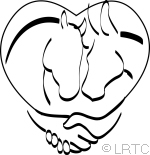
|
Least Resistance Training Concepts
|
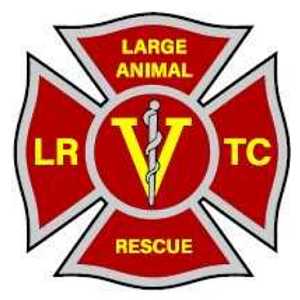
|
Hosted by Least Resistance Training Concepts
ONE DAY CLASSROOM AND HANDS-ON COURSE:
Emergency techniques for handling horses and other livestock |
| COURSE DETAILS |
EMERGENCY LIVESTOCK HANDLING
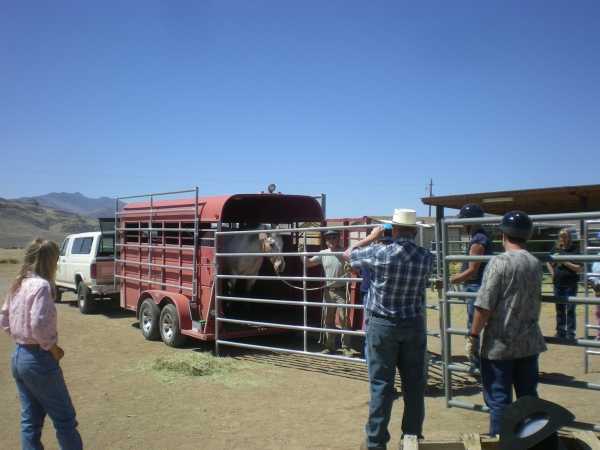
This course addresses emergency livestock handling, with an emphasis on horse handling, and includes best practices for managing, moving, containing, and loading large animals utilizing a variety of techniques.
The course emphasis involves effective teamwork when moving large animals, constructing containment corrals and loading chutes, and handling difficult animals.
Field objectives include rapid, safe evacuation techniques during emergencies, safe removal of livestock from highways, and recovering escaped (estray) livestock.
This course, or equivalent, is a prerequisite to receiving an operational level TLAR certificate for those taking the TLAR course.
Class size is limited. Priority will be given to public safety and animal control personnel and volunteers associated with the Nevada Dept. of Agriculture, animal services agencies or BLM. All others will be first come-first served. (If interest significantly exceeds program capacity, a second date may be scheduled.)
This course will involve handling live animals. The following personal protective equipment is required in order to participate.
- Helmet
- Work gloves
- Appropriate boots or work shoes
- Appropriate clothing (non-baggy shirt, long pants, etc.)
There are no training prerequisites to attend however to receive a completion certificate you need to provide documentation of completing the on-line courses indicated below.
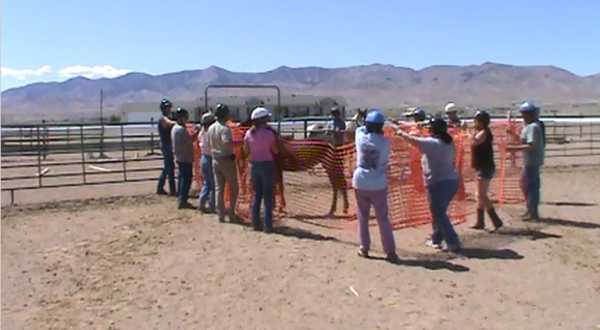
TECHNICAL LARGE ANIMAL RESCUE, OPERATIONS LEVEL
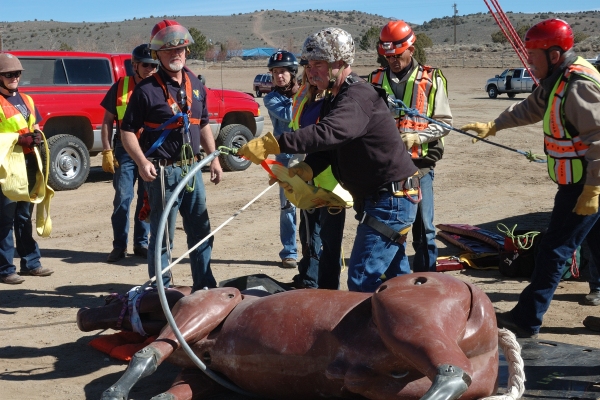
This course is an operations level course. In order to devote more time for practical exercise rescue scenarios, the large animal handling element of this level of instruction has been scheduled separately (see above.) In order to receive operations level completion certificates you will need to have completed the large animal handling element or a recognized equivalent.
This course will cover a number of scenarios including, but not limited to transportation accidents (overturned trailer scenarios,) rescues from confined spaces, responses to equestrian accidents, "packaging" and transporting downed or injured horses, and various techniques that should be employed when responding to these incidents.
Course elements will including incident size-up, organizing rescue operations, strategic and tactical decision making, incident safety, and hands-on practice with a variety of technical rescue tools and techniques.
Class size is limited. Priority will be given to public safety and animal control personnel, and to volunteers associated with the Nevada Dept. of Agriculture, animal services agencies or BLM. All others will be first come-first served.
This course will involve working with rescue tools and equipment. The following personal protective equipment is required in order to participate.
- Helmet
- Work gloves
- Appropriate boots or work shoes
- Appropriate clothing (non-baggy shirt, long pants, etc.)
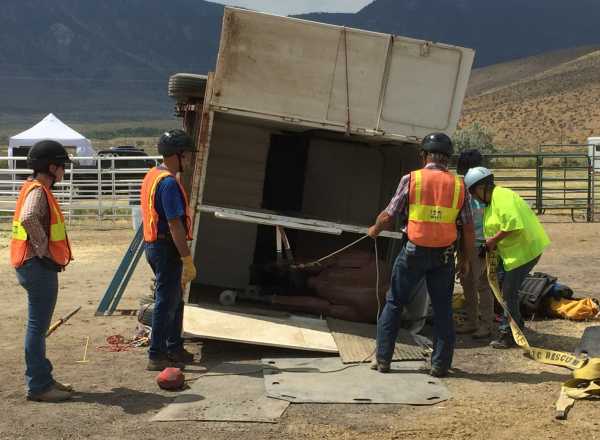
PREREQUISITES FOR COMPLETION CERTIFICATES
The following on-line courses are prerequisites for receiving completion certificates for the courses being offered. Some courses provide CEUs for members in the veterinary field.
Prerequisites for Emergency Horse & Livestock Handling certificate:
- IS-10a Animals in Disasters, Awareness and Preparedness.
Avg. course time, 3.5 hours CEUs, 0.4This course focuses primarily on animal owners but is a foundation for IS-11a, the course for shelters and responders.
- IS-11a Animals in Disasters, Community Planning.
Avg. course time, 4.5 Hrs. CEUs, 0.5This course focuses primarily on emergency management officials and care providers (animal volunteer groups.)
- IS-111a Livestock in Disasters.
Avg. course time, 3.5 Hrs. CEUs, 0.4This course focuses primarily on large animals and livestock.
Prerequisites Technical Large Animal Rescue Operations Level Certificate:
(In addition to the prerequisites listed above.)
-
IS-100b Introduction to Incident Command System. Note 1
Avg. course time, 3.0 Hrs. CEUs, 0.3This course explains the Incident Command System, the standardized operating system that professionals and volunteers must work within during significant emergencies.
-
IS-200b ICS for Single Resources and Initial Action Incidents. Note 1
Avg. course time, 3.0 Hrs. CEUs, 0.3This course provides instruction for volunteers who may have to assume unit or group supervisory responsibilities.
Note 1: Participants from agencies that provide instruction in these elements and/or who have taken equivalent courses in academy or fire technology or rescue programs will not be required to take the two ICS courses in order to receive a certificate.
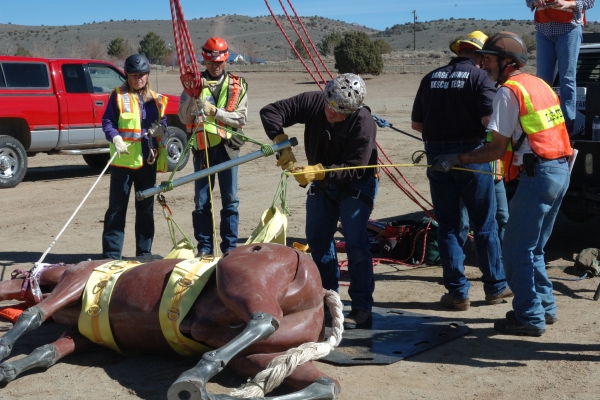
ROPE RESCUE SKILLS
|
Rescue scenarios will utilize rope rescue techniques.
Students should be familiar with:
Anyone needing to refresh on seldom used knots should visit Animated Knots by Grog. We can also schedule a rope rescue systems refresher session prior to the TLAR class if there is sufficient interest. |
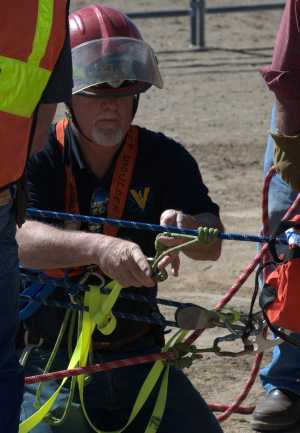
|
TECHNICAL LARGE ANIMAL RESCUE SYLLABUS
|
Areas of classroom instruction and hands-on skills practice will include (but are not limited to)
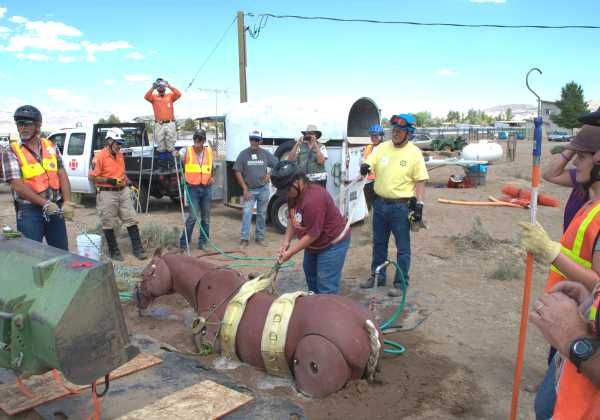
|
